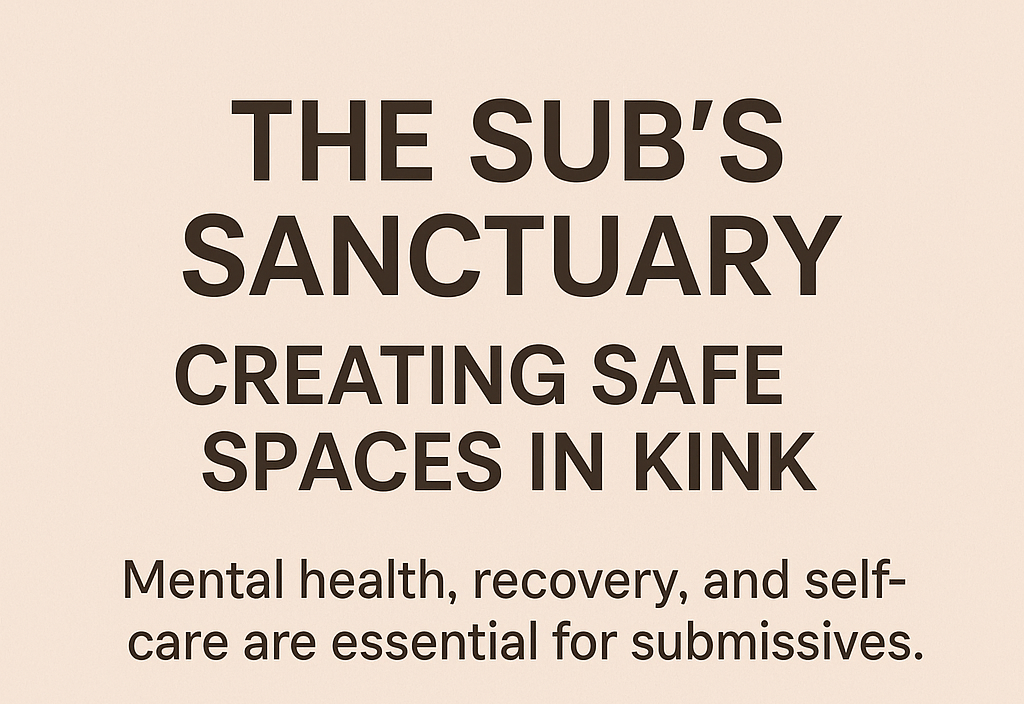Mental health, recovery, and self-care are just as vital in the BDSM world as safe words and consent. For submissives, particularly, emotional wellbeing plays a critical role in sustaining healthy, empowering kink dynamics. This post dives deep into the importance of building supportive spaces for subs, how to navigate emotional aftermath like sub drop, and ways to foster a personal sanctuary that supports both your play and your peace.
Why Emotional Safety Matters in BDSM
BDSM is built on trust, vulnerability, and surrender. While much attention is given to physical safety and consent negotiations, emotional safety often doesn’t get the spotlight it deserves. For submissives, giving up control can be incredibly cathartic — but it also opens up the potential for emotional vulnerability, triggers, or aftercare needs that extend beyond a single scene.
This is where mental health support in kink becomes essential.
Creating a “sanctuary” means more than a quiet room with aftercare snacks and fuzzy blankets (though those are lovely too). It means designing a lifestyle — whether online, in-person, or hybrid — where your submission is treated with care, respect, and emotional understanding.
Understanding Sub Drop and Recovery
One of the most common emotional experiences for submissives is sub drop — a physiological and emotional crash that can happen after a scene. It might look like sudden sadness, exhaustion, anxiety, or feeling disconnected.
This isn’t a weakness — it’s a normal reaction to the intense neurochemical cocktail involved in BDSM play.
To recover from sub drop, submissives often need:
- Emotional reassurance from their Dominant or support network
- Self-care rituals like rest, journaling, warm baths or grounding activities
- Time and space to decompress and reconnect with themselves
[This Domin8trix blog post on Aftercare Tips for Online Subs offers further guidance.]
Building a Support Network for Subs
Submission shouldn’t be an isolating journey. In fact, many subs thrive in communities where they feel seen, heard, and supported — even outside of their dynamics. Consider:
- Joining online sub communities or kink-aware mental health forums
- Connecting with other subs to share experiences and advice
- Seeking a kink-aware therapist if you’re navigating complex emotional patterns
Trusted resources like Pink Therapy and Switchboard offer directories for kink-affirming professionals in the UK.
Whether you’re new to BDSM or a seasoned submissive, your mental health deserves to be at the centre of your kink practice.
Creating Your Own Sanctuary
A sanctuary doesn’t have to be a physical space — it can be a mindset, a daily ritual, or a carefully curated digital corner of your life. Here’s how to begin:
- Establish your boundaries and communicate them clearly
- Develop aftercare routines that you can rely on — even when playing solo
- Create a journal, playlist or altar that reminds you of your strength and purpose in submission
- Keep a list of go-to affirmations or coping tools to ground yourself after intense scenes
You deserve a dynamic that uplifts you, not drains you. A Dominant who respects your needs, community that validates your voice, and self-care tools that carry you through the highs and lows.
Final Thoughts: Submission is Sacred
In the rush of roleplay, intensity, and erotic exploration, it’s easy to forget that submission is a sacred offering. You are giving a gift — your trust, your vulnerability, your energy. That gift deserves to be nurtured in return.
Whether you’re in a long-term D/s dynamic, exploring online submission, or embracing your own submissive identity, remember this:
Your submission deserves care — build your sanctuary.
Explore more support for your submission at Domin8trix.




Your writing has a way of making even the most complex topics accessible and engaging. I’m constantly impressed by your ability to distill complicated concepts into easy-to-understand language.
This truly means a lot — thank you. Creating content that feels accessible, validating, and empowering for the community is at the heart of what Domin8trix aims to do. I’m really glad the tone resonated with you, especially on an emotional wellbeing topic as nuanced as this one. If there are deeper angles or related subjects you’d like covered, feel free to share. I’m always open to shaping future posts around what supports readers most.
Really helpful post — very clear, actionable, and easy to follow.
Thank you so much for taking the time to read and leave such a kind comment. I’m really glad the post felt clear and actionable for you — supporting subs with practical, grounded guidance is something I’m passionate about. If there are any specific topics you’d like me to explore next, I’d love to hear your suggestions.